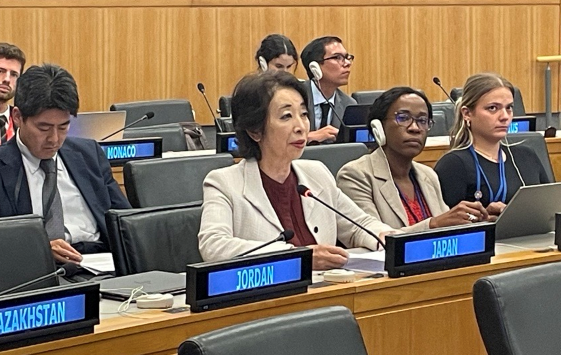Statement by H.E. Ambassador SHINO Mitsuko, Deputy Permanent Representative of Japan to the United Nations, at the General Debate of the 79th Session of the Second Committee
2024/10/8

Mr. Chair,
Let me first express our congratulations to Your Excellency Ambassador Muhammad Abdul Muhith of Bangladesh and the other bureau members on your appointments. I also convey our deep appreciation for His Excellency Ambassador Carlos Daniel Amorín Tenconi of Uruguay and the previous bureau members for their work.
It is with our deepest gratitude that we can gather again, continuing from last year. Japan would like to renew our commitment to engage openly and constructively in all the important discussions of this Committee.
Mr. Chair,
At the Summit for the Future last month, our leaders overcame great differences of opinion on various challenging and contentious issues and successfully adopted the Pact for the Future and its annexed documents; the Global Digital Compact and the Declaration on the Future Generations. This is a clear commitment by all Member States to take action toward the overarching goals of building inclusive societies across the international community, where everyone including women, youth, and future generations can thrive, and of achieving the SDGs, leaving no one behind.
Mr. Chair,
Now is the time to bring the Pact into action, by strengthening governance across the international community and working together for inclusive societies where the rule of law and human dignity are upheld.
Looking ahead, in particular to the actions related to sustainable development, we will have the 4th International Conference on Financing for Development and the 2nd World Summit for Social Development next year. However, the path forward starts here at the Second Committee. Japan would like to take this opportunity to recall our commitment embodied in the Pact and reiterate our shared responsibilities to be fulfilled.
Mr. Chair,
Allow me touch upon Japan’s policies on several specific issues.
First, we would like to emphasize the importance of “rule of law” and “human dignity”. No one denies that only a free and open international order based on the rule of law can deliver sustainable development and prosperity. As complex crises, such as poverty and climate change, cannot be tackled by a single Member State, international cooperation aimed at defending human dignity based on the concept of human security should continue to be strengthened. The 2030 Agenda’s promise to “leave no one behind” can only be achieved in this direction.
Second, from the perspective of human security, we should continue to take comprehensive measures to strengthen the protection and empowerment of all people and all communities, in particular women, children, and youth. In this regard, universal health coverage (UHC) and quality education should be prioritized in the Committee.
Third, disasters due to climate change continue to increase in scale, resulting in over $200 billion USD in economic losses per year globally. They are one of the main factors that derail our efforts on achieving SDGs. The Sendai Framework for Disaster Risk Reduction calls for increased assistance to countries, particularly vulnerable ones such as LDCs and SIDS. We should remain committed to advance disaster risk reduction as a global priority toward advancing sustainable development toward 2030 and beyond, emphasizing in particular the high return on pre-disaster investments which can reduce future liabilities and foster economic resilience.
Fourth, financing for development is critical to support developing countries. In particular, based on the consensus we reached in the Pact, there is no Member State which denies the urgent need to reform the international financial architecture (IFA). What is most important now is to chart the narrow path that balances the immediate financial needs of developing countries and the long-term sustainability of the international financial institutions. In this regard, we would like to reiterate that the United Nations and the international financial institutions have complementary mandates that make the coordination of their actions crucial, while fully respecting existing governance mechanisms and mandates.
Mr. Chair,
I would like to conclude my statement by reiterating our longstanding position that unnecessary programme budget implications will not be accepted. Japan looks forward to engaging in constructive discussions with a view to bringing the Pact into action and making tangible outcomes toward our common goal of achieving the SDGs.
I thank you.
